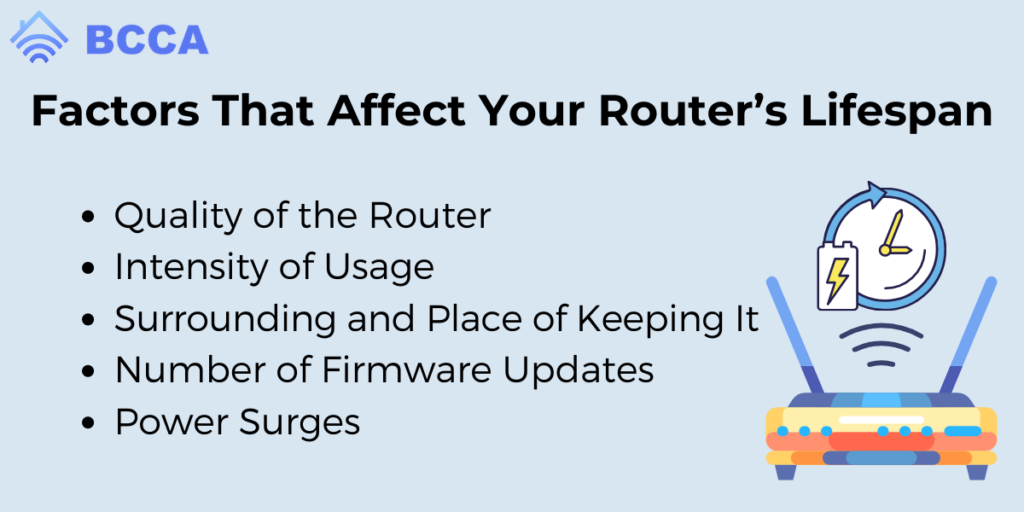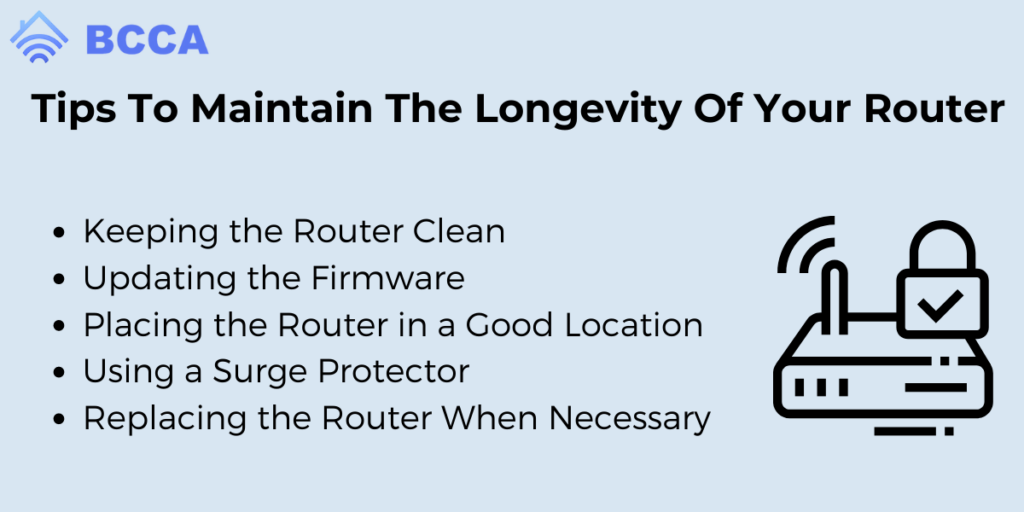In 2023 the internet has become a necessity. The majority of home appliances are gadgets that are becoming smart, and the internet is the key to syncing and operating them. And to connect multiple devices to the internet in one go, you need a router.
A router is a crucial device for anyone who wants to connect to the internet. This device lets you connect multiple devices to a network and allow them to share a single internet connection.
Routers last for a long time, but their lifespan is affected by various factors. If you have bought a router for the first time or are planning to buy one, you might be wondering how long a router lasts.
In this blog post, we will discuss the factors that can affect a router’s lifespan and provide some tips on how to maintain your router to ensure it lasts as long as possible. So keep on reading!
Table of Contents
Factors That Affect Your Router’s Lifespan

Like every gadget, routers also lose their efficiency over time which affects their lifespan. Some parts may get damaged due to prolonged use, or the software may reach its ultimate update capacity.
Along with that, below are some things you should understand if you are wondering how long your router will last.
1. Quality of the Router
The lifespan of any device depends on how well-made it is. Hence, the quality of the router is one of the most critical factors that affect its lifespan.
The higher the quality of the router, the longer it will last. Cheap routers may work fine for a short period, but they are more likely to break down or become obsolete quickly.
Remember, a high-quality router may cost more but will last longer and provide better performance. Therefore it will be a better value for money.
2. Intensity of Usage
A router is a machine made of wires, chips, and batteries. Therefore, it is obvious with more usage; the decay is faster. So the amount of usage a router gets can also affect its lifespan.
If a router is used heavily, it may wear out more quickly than one that is used less frequently. Heavy usage can cause the router to overheat, which can damage its internal components.
If you use your router for gaming, streaming, or other high-bandwidth activities, it will drain your router’s lifespan faster than ever. Whereas if you are doing basic internet usage, it won’t affect the router much.
3. Surrounding and Place of Keeping It
Some environments promote the decaying of your router’s parts, whereas some can prevent it. The environment in which the router is placed can also affect its lifespan.
Routers that are placed in areas with high humidity, dust, or extreme temperatures may wear out faster. If you keep it near a window that puts direct sunlight on it, there will be a risk of melting wires and hardware.
On the other hand, if your router is placed in a location that has poor ventilation, your router can get overheated and damaged due to poor ventilation.
4. Number of Firmware Updates
The more updated your router’s software is, the better it will run. Firmware updates are essential for keeping your router up-to-date and secure. All routers come with software pre-installed by the manufacturer that controls the inner workings of the router.
If you don’t update your router’s firmware regularly, it may become vulnerable to security threats, which can affect its lifespan.
Manufacturers release firmware updates regularly to fix bugs, improve performance, and add new features. Hence, keeping your router’s firmware up-to-date can help ensure that it lasts as long as possible.
5. Power Surges
Frequent current fluctuation and power surges can put a strain on your router, resulting in a reduced lifespan.
Lightning strikes, power outages, and other electrical issues can cause power surges that can damage the router’s internal components. To protect your router from power surges, consider using a surge protector.
Tips To Maintain The Longevity Of Your Router

While no method can guarantee to make the router last abnormally long, there are some measures you can take to prevent and slow down the damage.
Below are some maintenance tips that can make your router long-lasting.
1. Keeping the Router Clean
Like most other devices in your house, try to clean your router from time to time. Keeping your router clean can help ensure that it lasts as long as possible.
Dust and debris can accumulate inside the router, which can cause it to overheat and damage its components. To keep your router clean, use a soft cloth to wipe it down regularly.
Be gentle and do not tug and pull any wire. Also, do not sprinkle any liquid-based product, as it can cause a short circuit. While cleaning, make sure to turn the power switch off.
2. Updating the Firmware
As mentioned earlier, regularly updating your router’s firmware is essential for keeping it secure and up-to-date.
Check the manufacturer’s website regularly for firmware updates and install them as soon as they are available. Or you can easily check them on the mobile app connected to your router.
However, most routers these days get auto-updates, so you get notified. You just need to allow the download, and you’ll be good to go.
3. Placing the Router in a Good Location
Placing your router in a good location can also help ensure that it lasts as long as possible.
Places that are under direct sunlight or near damp and soggy atmospheres should be avoided.
Also, make sure you don’t put the router inside a drawer or put things too close around it. The device should have enough room for ventilation, or it might get overheated and damaged.
4. Using a Surge Protector
Using a surge protector can help protect your router from power surges. If you live in an area prone to lightning strikes or power outages, consider investing in a high-quality surge protector.
5. Replacing the Router When Necessary
While you may be following all the cautions, if there’s some manufacturing defect in your router, then it is bound to have a shorter lifespan.
Even if everything is good, it will eventually reach the end of its lifespan. When your router starts showing signs of wear and tear or is no longer providing the necessary performance for your needs, it may be time to replace it.
Upgrading to a newer and more advanced router may improve your internet speeds and connectivity, providing better performance for all your internet activities.
FAQ’s on Router’s Lifespan
It is good to replace your router every three to four years. This ensures that all the parts are working well and you are getting the optimum results.
The easiest way to detect whether your router needs to be replaced or not is by checking the internet speed. If your internet has been slower than usual for a long time now, it is time for an upgrade.
The easiest and cheapest way to measure your WiFi speed is through any free browser-based tests. OOKLA is a famous internet metrics company that provides pretty accurate results.
Now that 5G has entered the market, your WiFi should provide at least 30 Mbps speed. This way, you will be able to get enough bandwidth even if the router is connected to multiple devices at the same time.
Routers get affected by heat the most which is why the device is equipped with proper ventilation. So when you don’t place it in the right way, and the router can’t vent out heat properly, it starts to wear out.
Let’s Make Your Router More Durable!
While it is quite normal for your router to slow down after four or five years, without proper care, it can also get damaged within a couple of years. If you are not a heavy user, meaning you don’t do gaming, live streaming, or similar things that require heavy bandwidth, you can simply follow some tips to improve the lifespan of your device.
Keeping your device clean and placing it in a well-ventilated place are some of the very basic things you can follow that can help you keep your device healthy in the longer run. Also, adding a surge protector will ensure that your device stays protected from power surges.
Lastly, if you haven’t bought a router yet or are planning to upgrade, ensure to invest in a good-quality one. Or else none of the tips will work, and you may end up spending more on frequent servicing.
Chris loves technology, specifically smart home technology! With both hands-on and executive leadership experience in his corporate career, Chris stays abreast of emerging technology and solutions and immerses himself in BCCA when not in the office.
